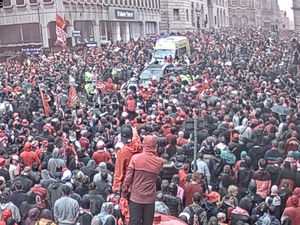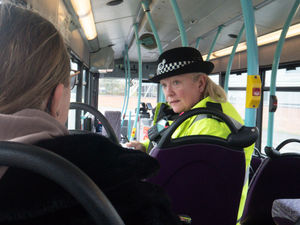WATCH: Police can't get to every crime, says retiring West Midlands chief constable Chris Sims
The public cannot expect to see as many bobbies on the beat or for police officers to respond in person to so-called 'lesser crimes', Britain's second highest ranking police officer has said.
West Midlands Police Chief Constable Chris Sims, who retires from his post in the January, said police forces had to be 'sensible' how they deployed their officers and could no longer 'resource every call' made to forces.
He also said more crime should be reported by victims online in future.
He told the Express & Star: "It would be very hard to think we would maintain that level of visibility that we have got.
"That is because things like cyber crime, domestic abuse are not threats dealt with by officers patrolling in uniform. There needs to be a rebalancing of how policing is delivered but I would be concerned if people were burgled and felt that we were not there to protect them.
"We have an ambition to have a better online presence than we do.
"If you are a victim of a lesser crime there is something to be said for reporting it online.
"I think if I was a victim of a less serious crime there is a kind of convenience at sitting at home to file a report and get a follow up. It is giving people more of a choice."
The former Staffordshire Police Chief Constable added: "We have to be sensible about how we use police resources given the litany of threats there are, but our primary job is to protect people.
"Our service is really important to us but it has to sit next to an obligation to protect.
"There are not many public services now where you can pick the phone up and the service comes to you in an unconditional way and we have to accept we move over a period of time from being literally able to resource every call people make."
Mr Sims has presided over West Midlands Police since 2009 and overseen cuts of £130 million since 2010 and the loss of 3,000 police officers and staff due to government austerity.
He admitted that fewer officers meant the force was unable to as much as it wanted but that delivering results had not been affected.
But he said the force would struggle if there were further high-scale cuts.
He said: "I think we were able to take a lot of the pain of job losses from the areas that were not impacting on the service and protection of the public. I am not sure we could have continued that for another five years.
"We have lost around 3,000 staff during that period – you can always do more with more people – that is obvious. What we did is manage to get in a pattern where we were changing the way we worked quicker than we were losing staff. So we managed responding to the public and crime and slightly improved where we were but with the sense that if you do not change faster than you shrink you have a real problem"





